#GNU Terry Pratchett
Text
Granny Weatherwax and Sam Vimes wouldn’t get on at all, and they’d never admit why, but it’s because they’re too similar. They both have an internal morality more sturdy and unmovable than a mountain, they both know they contain the capacity for great evil, but keep themselves in line with self discipline the likes of which most people couldn’t dream of. They both know about the importance of choice, and of truth, and of autonomy. If either of them were able to look past their aversion to seeing their own reflection, and worked together, they’d be fucking unstoppable.
Something about two of the main Discworld series being focused on these intensely determined, stubbornly moral people just really means a lot to me. You’ve got Moist using his criminal mind to help people, and the wizards doing whatever wizards do, and Death showing kindness to people in their most vulnerable moments. And you’ve got these two, making the world a better place whether it likes it or not. It will get better, or else, they say. Or else you’ll have me to deal with.
364 notes
·
View notes
Text

Really quick Monstrous Regiment comic because I miss Wazzer and love her to bits.
I like my female characters strange and unsettling.
#art#drawing#comic#discworld#discworld fanart#monstrous regiment#gnu terry pratchett#terry pratchett#Wazzer Goom
194 notes
·
View notes
Text
TERFs with Discworld usernames make me snort. What the fuck kind of mental gymnastics do you have to do to believe that the man, who invented Cheery Littlebottom and wrote Monstrous Regiment while the cultural zeitgeist was still cracking "hot girl used to be a dude" jokes, would be anything but a staunch advocate of trans people? Man whose entire body of work reiterates "telling people how they should be is stupid and trying to force them to conform to your ideas is evil"? Hello??
#terfs#kudos to his daughter for telling them loudly and bluntly that they embodied everything her dad hated#and he'd never in a million years have endorsed any of their fuckery#that's a great job looking after the legacy of a parent that raised them right#sincerely and from the bottom of my heart i hope nothing good ever happens to you in your lives#transphobia#scum of the universe#gnu terry pratchett#pterry#discworld#knee of huss
81 notes
·
View notes
Text
I feel like Jackrum and Polly both do “funny as long as they were useless, and safe as long as they were funny” thing. Jackrum plays up the jolly fat man routine to manipulate people into getting what he wants and discouraging people from further investigation, just as Pols acted like the ditzy bargirl to avoid abomination and convince people let their guard down. I think they both got it instilled in them for similar reasons, being a girl in an overly conservative and militaristic country. They both use it in the regiment when dealing with the higher ups.
This isnt as articulate as I would have liked but whatever.
#discworld#gnu terry pratchett#I’m in the middle of rereading#I know this probably is nothing new under the sun#20yr old book and all#but I like at least pretending to contribute to the conversation#monstrous regiment#sgt jackrum#?#idk his character tag#jack jackrum#polly perks#I saw that jackrum quote someone posted on here which made me think of this#gender presentation could also be brought into this#probably#it is like one of the Themes of the book
36 notes
·
View notes
Text

#discworld#gnu terry pratchett#meme#discworld meme#created by yours truly#making money#moist von lipwig#mr fusspot#ankh morpork#royal bank of ankh morpork
38 notes
·
View notes
Text
Imagine just how funny a Discworld's take on NFT would be. Imagine CMOT Dibbler selling badly-drawn pictures of the Librarians via the clacks.
#moist would be so tempted to go back to being a conman after seeing people fall for something this stupid#discworld#gnu terry pratchett#cmot dibbler#discworld librarian
16 notes
·
View notes
Text
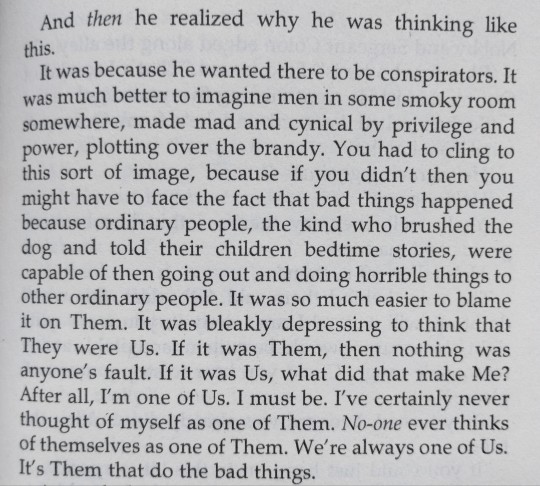
76K notes
·
View notes
Text

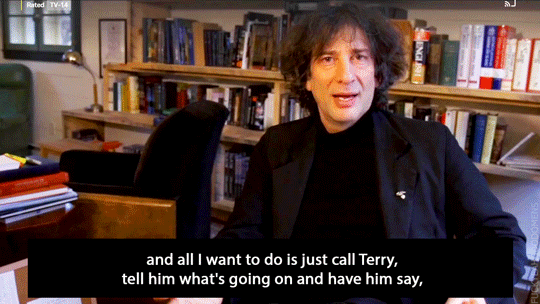
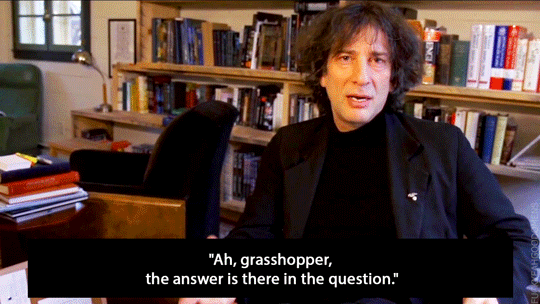
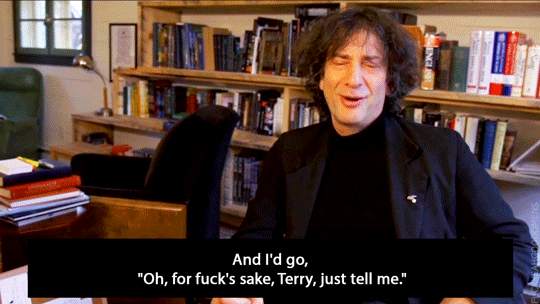

From the Neil Gaiman: Dream Dangerously 🥺❤ (you can watch it here in US or with US vpn :) <3) (or just this bit on youtube here :))
Neil Gaiman: I miss him most when I get stuck. You know, I'll just be
working on something and I'll go, "Oh, this isn't quite it," and all I want to do is just call Terry, tell him what's going on and have him say, "Ah, grasshopper, the answer is there in the question." And I'd go, "Oh, for fuck's sake, Terry, just tell me."
[Terry Pratchett laughing]
#good omens#gointerviewedit#terry pratchett#neil gaiman#terry and neil#terry interview#interview#neil interview#gnu terry pratchett#neil gaiman dream dangerously#fun fact#btb#dream dangerously#❤#neil about terry#grasshopper the answer is there in the question#ixi says ngk
24K notes
·
View notes
Text
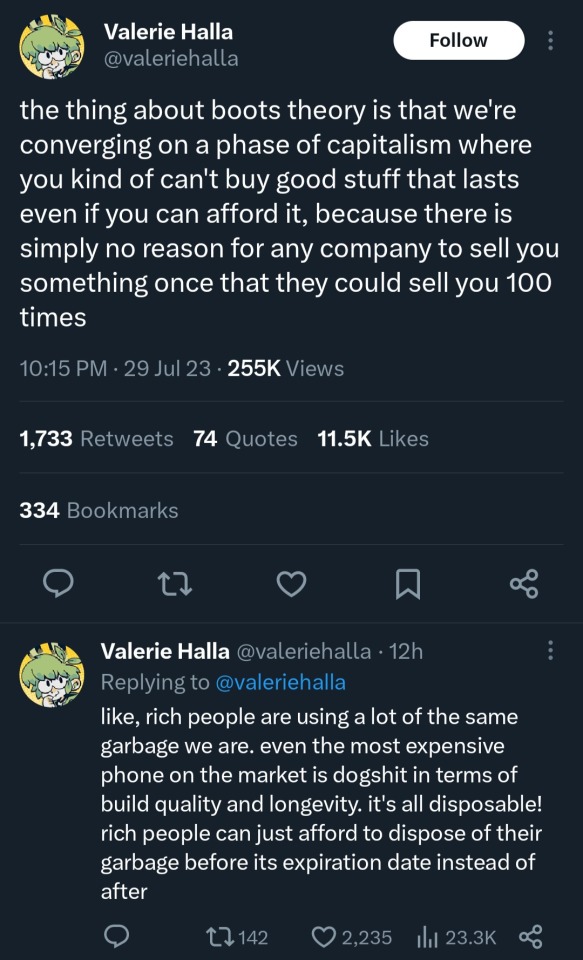
This makes me so sad and also I'm trying to remember if any of the Discworld books dealt with late stage capitalism
70K notes
·
View notes
Text
Reading a Terry Pratchett book is literally just:
Here's a funny little joke
Here's something that you can tell is a joke but don't get and will only figure out five years later
Here's a surprisingly cool fantasy concept
Here's a unique and well written simile
Here's a lil guy
Here's something that has aged depressingly well into the modern day
Here's something that has aged remarkably queer into the modern day
Here's a character that you can barely understand what he's saying
Here is the most terrifying and deeply disturbing concept you have ever heard, casually mentioned
Here is the dumbest fucking pun you've ever heard but in the best way
Here is a quote so profound that it makes you view morality and the world in a different way
Here is a plot twist that you can't tell if it's genius or stupid
Congratulations! You've finished the book! It has fundamentally changed you as a person and you will never be the same!
#discworld#terry pratchett#gnu terry pratchett#tiffany aching#monstrous regiment#terry pratchett watch
47K notes
·
View notes
Text
@neil-gaiman you're a saint
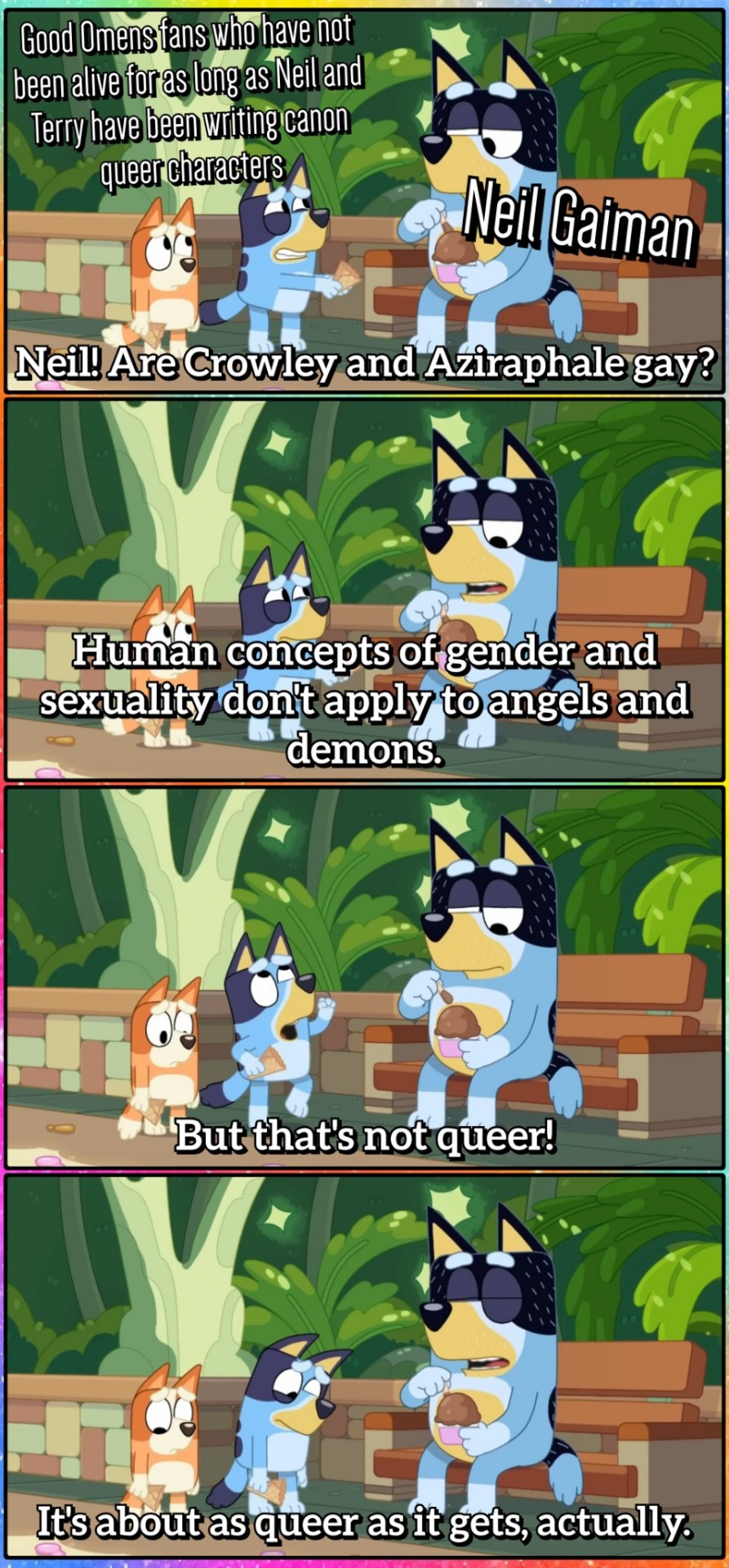
#good omens#neil gaiman#terry pratchett#gnu terry pratchett#good omens season 2#crowley#aziraphale#ineffable husbands#queer representation#bluey#oc meme#sing-you-fools#1k#5k#10k#25k
38K notes
·
View notes
Text
This is the highest compliment I can bestow, but Dungeon Meshi reads like it was written for, if not by, Terry Pratchett.
Oh, you have a dungeon with monsters and adventurers? How does it work? Who pays? How do you get enough supplies? People will eat anything when hungry; do they eat the monsters? People will cook feasts from rotten meat and weeds; what feasts can you make with monsters?
By the way, here is a terrible pun about soup.
You want heroes to have peril, but also to live? Easy! Just have a ressurection spell. Well how does it work? What's the point? What would people give to live forever? What would people give to die?
Here's a dwarf whose magical shield is a wok.
And if they come back, it still hurts right? Do people remember? What happens if they forget that, outside of the dungeon, they can't come back? What if the thing that brings them back also ties them to the dungeon more and more, changes them, makes them different without knowing why.
Whilst you were thinking about that, the halfling founded an adventurers guild. It's an actual union with dues etc. btw he's a deadbeat dad apart from this.
The dwarf from earlier carries familial trauma that will haunt you for the next decade. The protagonist holds his sister's skull as the first proof that there is anything left of her. The two female leads share a love so deep that giving it a name would pollute it. The protagonist's sword is a mollusc.
20K notes
·
View notes
Text
Sir Terry Pratchett: on writing Good Omens with Neil Gaiman
I love the whole interview but this little snippet most of all:
Terry: “You can usually bet, and I’m sure Neil Gaiman would say the same thing, that, uh, if I go into a bookstore to do a signing and someone presents me with three books, the chances are that one of them is going to be a very battered copy of Good Omens; and it will smell as if it’s been dropped in parsnip soup or something in and it’s gone fluffy and crinkly around the edges and they’ll admit that it’s the fourth copy they’ve bought”.
You can never own enough Good Omens copies.
#good omens#terry pratchett#neil gaiman#crowley#aziraphale#ineffable husbands#good omens fun facts#good omens interviews#this place is lacking on Terry interviews#i will bring them here#parsnip#gnu terry pratchett
11K notes
·
View notes
Text
if he was still alive I know in my heart that Terry Pratchett would have done a bit about Igors and Igorinas doing gender confirmation surgery by now. going into a lab full of bubbling vials and picking out a penis from a tank the way you pick a lobster. that one, please. you gotta be careful though because they'll really try to upsell you into getting two or three installed. people going to the clinic as pairs and just having parts swapped out for a discounted rate. maybe you actually just trade brains, that's even easier. Igorth have already been doing that thurgery for thenturieth.
15K notes
·
View notes
Text
Awhile ago @ouidamforeman made this post:
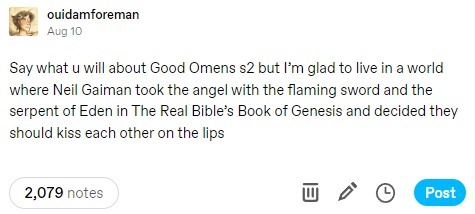
This shot through my brain like a chain of firecrackers, so, without derailing the original post, I have some THOUGHTS to add about why this concept is not only hilarious (because it is), but also...
It. It kind of fucks. Severely.
And in a delightfully Pratchett-y way, I'd dare to suggest.
I'll explain:
As inferred above, both Crowley AND Aziraphale have canonical Biblical counterparts. Not by name, no, but by function.
Crowley, of course, is the serpent of Eden.
(note on the serpent of Eden: In Genesis 3:1-15, at least, the serpent is not identified as anything other than a serpent, albeit one that can talk. Later, it will be variously interpreted as a traitorous agent of Hell, as a demon, as a guise of Satan himself, etc. In Good Omens --as a slinky ginger who walks funny)
Lesser known, at least so far as I can tell, is the flaming sword. It, too, appears in Genesis 3, in the very last line:
"So he drove out the man; and placed at the east of the garden of Eden Cherubims, and a flaming sword which turned every way, to keep the way of the tree of life."
--Genesis 3:24, KJV
Thanks to translation ambiguity, there is some debate concerning the nature of the flaming sword --is it a divine weapon given unto one of the Cherubim (if so, why only one)? Or is it an independent entity, which takes the form of a sword (as other angelic beings take the form of wheels and such)? For our purposes, I don't think the distinction matters. The guard at the gate of Eden, whether an angel wielding the sword or an angel who IS the sword, is Aziraphale.
(note on the flaming sword: in some traditions --Eastern Orthodox, for example-- it is held that upon Christ's death and resurrection, the flaming sword gave up it's post and vanished from Eden for good. By these sensibilities, the removal of the sword signifies the redemption and salvation of man.
...Put a pin in that. We're coming back to it.)
So, we have our pair. The Serpent and the Sword, introduced at the beginning and the end (ha) of the very same chapter of Genesis.
But here's the important bit, the bit that's not immediately obvious, the bit that nonetheless encapsulates one of the central themes, if not THE central theme, of Good Omens:
The Sword was never intended to guard Eden while Adam and Eve were still in it.
Do you understand?
The Sword's function was never to protect them. It doesn't even appear until after they've already fallen. No... it was to usher Adam and Eve from the garden, and then keep them out. It was a threat. It was a punishment.
The flaming sword was given to be used against them.
So. Again. We have our pair. The Serpent and the Sword: the inception and the consequence of original sin, personified. They are the one-two punch that launches mankind from paradise, after Hell lures it to destruction and Heaven condemns it for being destroyed. Which is to say that despite being, supposedly, hereditary enemies on two different sides of a celestial cold war, they are actually unified by one purpose, one pivotal role to play in the Divine Plan: completely fucking humanity over.
That's how it's supposed to go. It is written.
...But, in Good Omens, they're not just the Serpent and the Sword.
They're Crowley and Aziraphale.
(author begins to go insane from emotion under the cut)
In Good Omens, humanity is handed it's salvation (pin!) scarcely half an hour after losing it. Instead of looming over God's empty garden, the sword protects a very sad, very scared and very pregnant girl. And no, not because a blameless martyr suffered and died for the privilege, either.
It was just that she'd had such a bad day. And there were vicious animals out there. And Aziraphale worried she would be cold.
...I need to impress upon you how much this is NOT just a matter of being careless with company property. With this one act of kindness, Aziraphale is undermining the whole entire POINT of the expulsion from Eden. God Herself confronts him about it, and he lies. To God.
And the Serpent--
(Crowley, that is, who wonders what's so bad about knowing the difference between good and evil anyway; who thinks that maybe he did a GOOD thing when he tempted Eve with the apple; who objects that God is over-reacting to a first offense; who knows what it is to fall but not what it is to be comforted after the fact...)
--just goes ahead and falls in love with him about it.
As for Crowley --I barely need to explain him, right? People have been making the 'didn't the serpent actually do us a solid?' argument for centuries. But if I'm going to quote one of them, it may as well be the one Neil Gaiman wrote ficlet about:
"If the account given in Genesis is really true, ought we not, after all, to thank this serpent? He was the first schoolmaster, the first advocate of learning, the first enemy of ignorance, the first to whisper in human ears the sacred word liberty, the creator of ambition, the author of modesty, of inquiry, of doubt, of investigation, of progress and of civilization."
--Robert G. Ingersoll
The first to ask questions.
Even beyond flattering literary interpretation, we know that Crowley is, so often, discreetly running damage control on the machinations of Heaven and Hell. When he can get away with it. Occasionally, when he can't (1827).
And Aziraphale loves him for it, too. Loves him back.
And so this romance plays out over millennia, where they fall in love with each other but also the world, because of each other and because of the world. But it begins in Eden. Where, instead of acting as the first Earthly example of Divine/Diabolical collusion and callousness--
(other examples --the flood; the bet with Satan; the back channels; the exchange of Holy Water and Hellfire; and on and on...)
--they refuse. Without even necessarily knowing they're doing it, they just refuse. Refuse to trivialize human life, and refuse to hate each other.
To write a story about the Serpent and the Sword falling in love is to write a story about transgression.
Not just in the sense that they are a demon and an angel, and it's ~forbidden. That's part of it, yeah, but the greater part of it is that they are THIS demon and angel, in particular. From The Real Bible's Book of Genesis, in the chapter where man falls.
It's the sort of thing you write and laugh. And then you look at it. And you think. And then you frown, and you sit up a little straighter. And you think.
And then you keep writing.
And what emerges hits you like a goddamn truck.
(...A lot of Pratchett reads that way. I believe Gaiman when he says Pratchett would have been happy with the romance, by the way. I really really do).
It's a story about transgression, about love as transgression. They break the rules by loving each other, by loving creation, and by rejecting the hatred and hypocrisy that would have triangulated them as a unified blow against humanity, before humanity had even really got started. And yeah, hell, it's a queer romance too, just to really drive the point home (oh, that!!! THAT!!!)
...I could spend a long time wildly gesturing at this and never be satisfied. Instead of watching me do that (I'll spare you), please look at this gif:
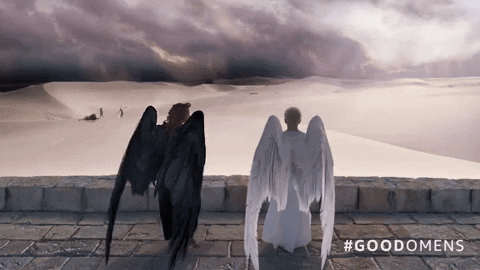
I love this shot so much.
Look at Eve and Crowley moving, at the same time in the same direction, towards their respective wielders of the flaming sword. Adam reaches out and takes her hand; Aziraphale reaches out and covers him with a wing.
You know what a shot like that establishes? Likeness. Commonality. Kinship.
"Our side" was never just Crowley and Aziraphale. Crowley says as much at the end of season 1 ("--all of us against all of them."). From the beginning, "our side" was Crowley, Aziraphale, and every single human being. Lately that's around 8 billion, but once upon a time it was just two other people. Another couple. The primeval mother and father.
But Adam and Eve die, eventually. Humanity grows without them. It's Crowley and Aziraphale who remain, and who protect it. Who...oversee it's upbringing.
Godfathers. Sort of.
#good omens#ineffable husbands#aziracrow#good omens 2#crowley#aziraphale#good omens meta#I have no idea if I've made a coherent point here but I'm tired of this being in my drafts; RAW FEELINGS IT IS#it's about being sent to destroy and instead staying to love and protect and nurture I'M CRAZY I'M CRAZY RAAAAAAAGGHHHH#gnu terry pratchett
26K notes
·
View notes
Text
It’s not a Discworld joke unless you read it, don’t parse it as a joke, and then carry on with your life for ten years until someone stops you to say something like “It’s a pavlovian response because the dog ate a pavlova” and you scream Terry’s name with enough indignant rage you hope it rattles the pillars of the multiverse so wherever his soul is he’ll hear it.
#discworld#gnu terry pratchett#i don’t think this is what pterry meant by ‘a man’s not dead while his name is still spoken’#10k#20k
29K notes
·
View notes